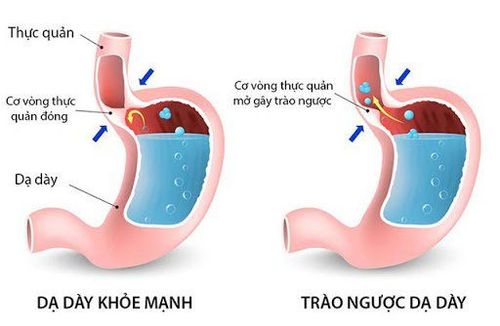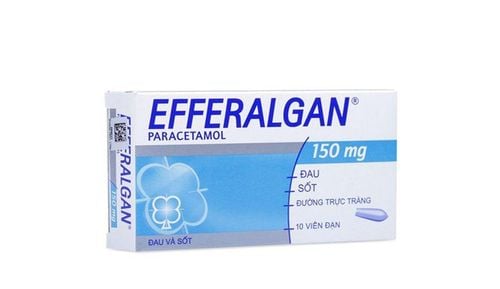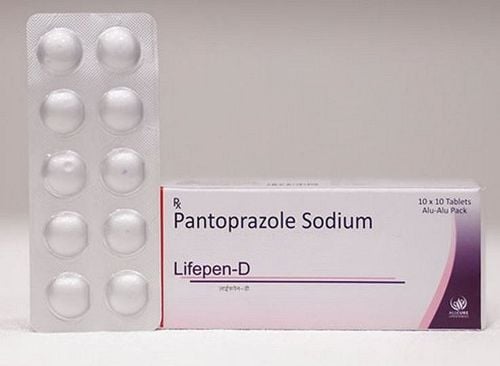This is an automatically translated article.
Acid gastric juice is an essential catalytic component in the process of food digestion taking place in the stomach. However, if there is an abnormality that leads to increased secretion of this catalyst, it will cause a number of related diseases such as stomach pain, reflux ... To handle this situation, the treatment method The most commonly used treatment is the use of drugs to reduce gastric acid secretion.
1. Stomach ache
Stomach pain is a common disease in modern society, due to many causes, one of which is excessive secretion of gastric acid, which is a catalyst in the digestion of food. When this increased secretion occurs, the body will have some common clinical manifestations such as epigastric abdominal pain, often associated with meals, nausea, vomiting, heartburn, sometimes with may vomit blood ... The patient will be examined clinically and performed a number of paraclinical techniques such as gastrointestinal endoscopy, histopathological examination to confirm the diagnosis.
2. How to reduce gastric acid secretion?
The way to reduce gastric acid secretion to treat gastric pain or other related diseases is to use PPI proton pump inhibitors. This is a drug that works to reduce gastric acid secretion
Drugs that reduce gastric acid secretion have the ability to inhibit H +, K + - ATPase is an enzyme in the apical secretory membrane of parietal cells. The drug works for a long time, causing stomach ulcers to heal. In addition, the drug is also used to treat peptic ulcers caused by H. pylori.
Currently, there are 5 generations of PPIs used, including:
Omeprazol: Specific inhibition of gastric acid secretion in gastric parietal cells. The drug has the highest effect after taking it for 4 days with the healing rate of ulcers about 70% - 80%. When patients used this drug for one month, the chance of ulcer healing increased to 85%. However, if the patient is treated with only 1 dose of this drug, the possibility of recurrence will also be very high. Lansoprazole : The period of use is 8 weeks, the ulcer healing rate is said to be 89% - 92%, the drug has the ability to kill H. pylori about 21% - 43%. Pantoprazole : The drug has a very high ability to heal stomach ulcers, is said to be up to 99%, in addition, it also works to reduce pain symptoms in this disease and almost has very few unwanted effects for users. use. Rabeprazole: This is a very strong generation of PPIs, 2-20 times higher than the generation of Omeprazole, specifically, the drug can effectively reduce gastric acid secretion in the first day of taking the drug, with an effective rate. the result is 88%. Esomeprazole: This generation of drugs is composed of optical isomer S that is not metabolized by cytophan P450 enzymes in time, so it can be used for a long time.
3. Drugs to reduce gastric acid secretion
When using PPIs to treat increased gastric acid secretion, there are some notes as follows:
At first, there may be some symptoms such as headache, diarrhea or constipation. Therefore, patients should be monitored for these symptoms. If used for a long time, the patient is likely to have osteoporosis, even fracture, so these cases should be consulted by a doctor before taking the drug for a long time. The drug is recommended to be taken about 30 minutes before meals so that when there is food in the stomach and an increase in gastric secretion occurs, the drug has enough time to work. The drug dissolves very quickly in an acidic environment, so the patient needs to swallow the whole pill to maximize its effectiveness. Some common drug interactions: The most common is the interaction between PPIs and sedatives Seduxen because Seduxen will prevent the drugs from performing some of the metabolism needed to treat the disease and make the drug faster. eliminated more quickly. In addition, PPIs also cause some interactions with NSAIDS because PPIs will reduce gastric acid secretion and gastric protectors, so when used together with NSAIDS, it will easily cause some diseases. PPI drugs may interact with antiplatelet drugs such as Aspirin, Clopidogrel ... so patients should pay attention and notify the doctor immediately when this situation occurs. PPI drugs also reduce the absorption of Magnesium, calcium ... so the possibility of gastrointestinal infections during the use of the drug is very high, especially infection with anaerobic intestinal bacteria. Therefore, precautions should be taken when taking this drug for a long time. The recommended dose of the drug is a low dose for the shortest possible time, should not be used for too long, should only be used in cases of real need and must be prescribed by a treating doctor.
4. Conclusion
Drugs that reduce gastric acid secretion are used to treat a number of gastrointestinal diseases such as stomach pain, peptic ulcer disease, gastroesophageal reflux disease, etc. Although the drug has a relatively high effect, the drug There are still some notes on how to use and the dose that patients need to pay attention to to minimize the negative effects on health during drug use.
Please dial HOTLINE for more information or register for an appointment HERE. Download MyVinmec app to make appointments faster and to manage your bookings easily.













